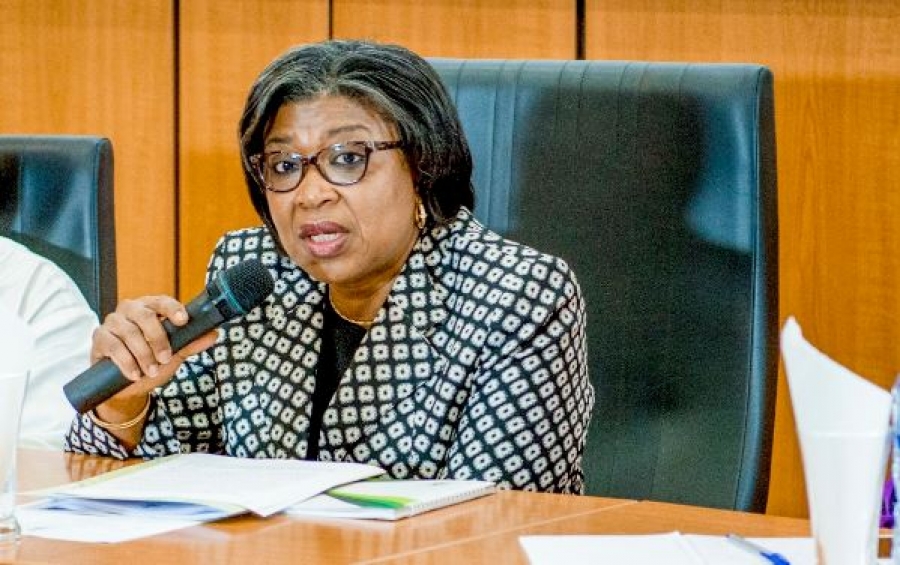Budget deficits, low incomes responsible for rising debt – DMO
The Debt Management Office (DMO) says decades of operating budget deficits by successive governments are responsible for Nigeria's high debt profile.
DMO Director General Patience Oniha told the News Agency of Nigeria (NAN) on Sunday in Abuja.
According to Ms. Oniha, a review of Nigeria's fiscal data shows that not only has the government operated budget deficits, which have increased, but most of the deficits have been financed by local and external borrowing.
"Records show annual budget deficits, including supplementary budgets, increased to N10.78 trillion in 2023 from N1.62 trillion in 2015.
"Between 82% and 99% of these were financed by new borrowing, which ranged from N1.46 trillion in 2015 to N8.8 trillion in 2023.
“These facts confirm that these budget deficits, financed by new borrowing, were responsible for the rapid growth in the stock of debt and the resulting increase in debt servicing,” said- she said.
According to Ms. Oniha, this trend could have been avoided or at least moderated if incomes had been higher or expenses lower.
She instructed the new government of Bola Tinubu to take notice of the situation and prioritize increasing revenue generation.

“Budget deficits would have been much lower, otherwise Nigeria would have been running on a balanced budget.
“It is therefore imperative that the new government take into account the perennial budget deficits in the preparation of the medium-term expenditure framework (2024 - 2026) and the 2024 budget.
ALSO READ: DMO puts Nigeria's debts at 41.6 billion naira and asks NASS to control budget deficits“The government should also accelerate revenue growth to ensure debt sustainability,” she said.
Nigeria's debt profile stood at N46.25 trillion in December 2022, registering an increase of around N7 trillion from 2021 debt figures.
Total government debt outstanding, however, includes outstanding domestic and external debt of the federal government, the 36 state governments, and the Federal Capital Territory.
In terms of composition, the total stock of domestic debt is N27.55 trillion ($61.42 billion), while the total stock of external debt is N18.7 trillion ( $41.6 billion)
However, the government debt figures exclude the Federal Government's debt of N22.7 trillion to the Central Bank of Nigeria (CBN) through Ways and Means Advances.


Ways and Means advances, which the Senate has securitized, and awaiting simultaneous securitization by the House of Representatives, are included in the country's outstanding public debt.
Despite the country's soaring debt profile, which has increased astronomically under the Buhari administration due to excessive borrowing, the incumbent president is seeking another $800 million loan from the Labor Bank .
The loan, if approved by the Senate, will be used to finance the government's conditional cash transfer to vulnerable Nigerians.
(NAN)
Support PREMIUM TIMES integrity and credibility journalism Good journalism is very expensive. Yet only good journalism can guarantee the possibility of a good society, an accountable democracy and a transparent government. For free and continued access to the best investigative journalism in the country, we ask you...
The Debt Management Office (DMO) says decades of operating budget deficits by successive governments are responsible for Nigeria's high debt profile.
DMO Director General Patience Oniha told the News Agency of Nigeria (NAN) on Sunday in Abuja.
According to Ms. Oniha, a review of Nigeria's fiscal data shows that not only has the government operated budget deficits, which have increased, but most of the deficits have been financed by local and external borrowing.
"Records show annual budget deficits, including supplementary budgets, increased to N10.78 trillion in 2023 from N1.62 trillion in 2015.
"Between 82% and 99% of these were financed by new borrowing, which ranged from N1.46 trillion in 2015 to N8.8 trillion in 2023.
“These facts confirm that these budget deficits, financed by new borrowing, were responsible for the rapid growth in the stock of debt and the resulting increase in debt servicing,” said- she said.
According to Ms. Oniha, this trend could have been avoided or at least moderated if incomes had been higher or expenses lower.
She instructed the new government of Bola Tinubu to take notice of the situation and prioritize increasing revenue generation.

“Budget deficits would have been much lower, otherwise Nigeria would have been running on a balanced budget.
“It is therefore imperative that the new government take into account the perennial budget deficits in the preparation of the medium-term expenditure framework (2024 - 2026) and the 2024 budget.
ALSO READ: DMO puts Nigeria's debts at 41.6 billion naira and asks NASS to control budget deficits“The government should also accelerate revenue growth to ensure debt sustainability,” she said.
Nigeria's debt profile stood at N46.25 trillion in December 2022, registering an increase of around N7 trillion from 2021 debt figures.
Total government debt outstanding, however, includes outstanding domestic and external debt of the federal government, the 36 state governments, and the Federal Capital Territory.
In terms of composition, the total stock of domestic debt is N27.55 trillion ($61.42 billion), while the total stock of external debt is N18.7 trillion ( $41.6 billion)
However, the government debt figures exclude the Federal Government's debt of N22.7 trillion to the Central Bank of Nigeria (CBN) through Ways and Means Advances.


Ways and Means advances, which the Senate has securitized, and awaiting simultaneous securitization by the House of Representatives, are included in the country's outstanding public debt.
Despite the country's soaring debt profile, which has increased astronomically under the Buhari administration due to excessive borrowing, the incumbent president is seeking another $800 million loan from the Labor Bank .
The loan, if approved by the Senate, will be used to finance the government's conditional cash transfer to vulnerable Nigerians.
(NAN)
Support PREMIUM TIMES integrity and credibility journalism Good journalism is very expensive. Yet only good journalism can guarantee the possibility of a good society, an accountable democracy and a transparent government. For free and continued access to the best investigative journalism in the country, we ask you...What's Your Reaction?






















